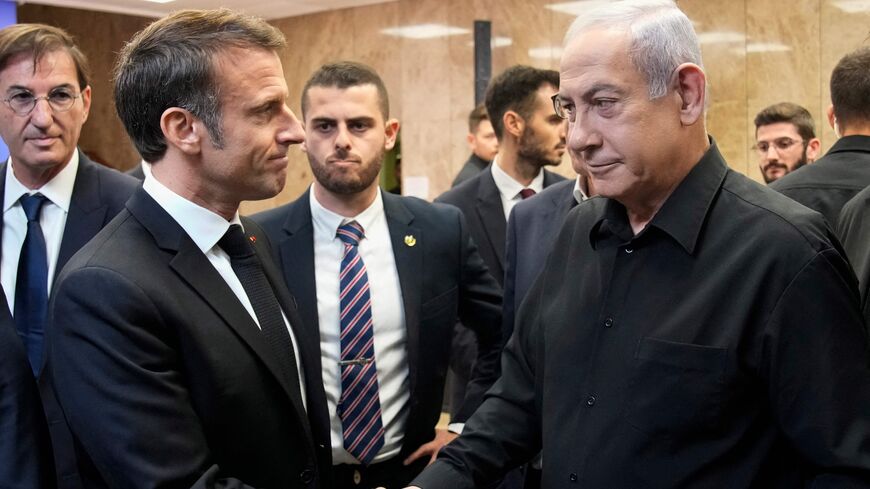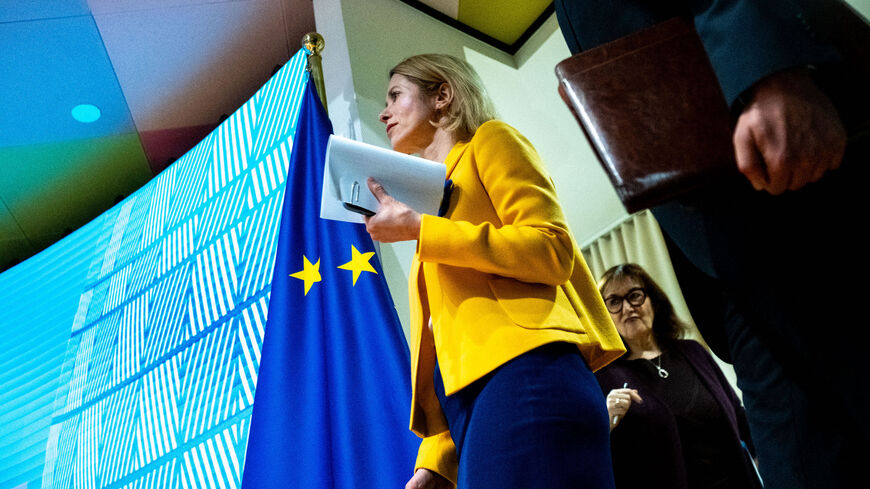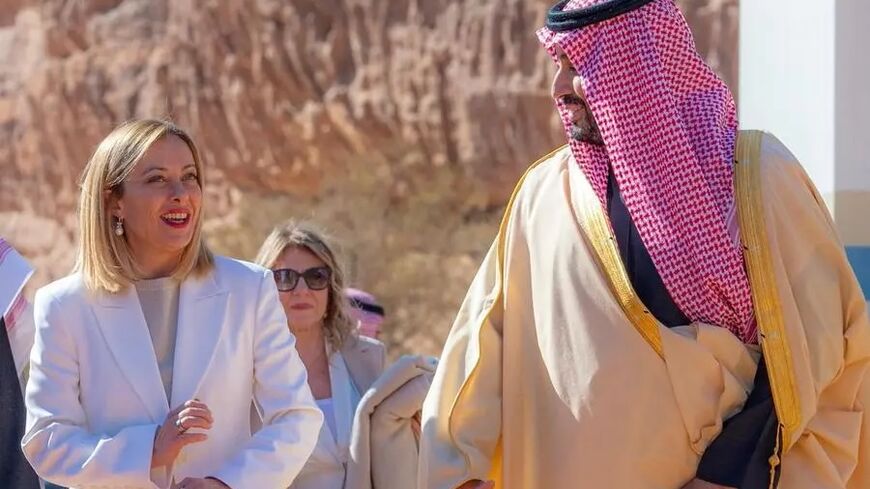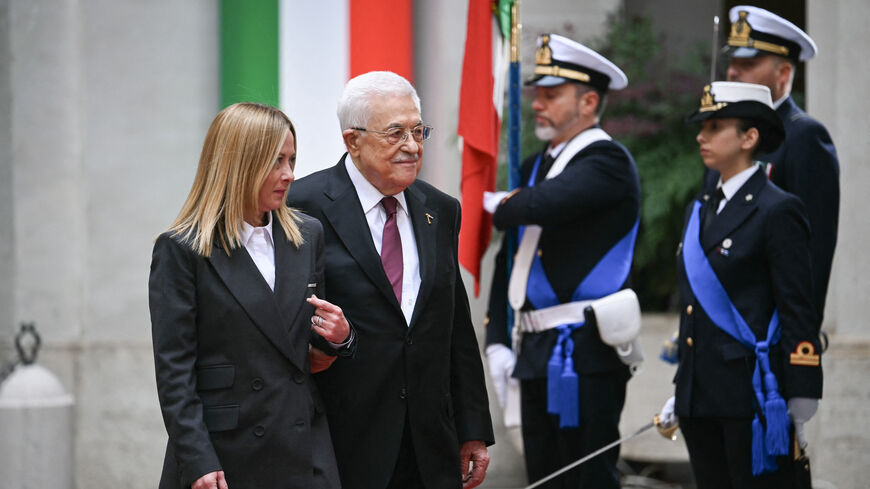Once an ally, Italy’s Meloni sours on Israel's Netanyahu, repositions on Gaza
With regional stability at stake and a growing humanitarian crisis in Gaza, Rome has adjusted its position and Netanyahu can no longer assume Italian Prime Minister Giorgia Meloni is in his political pocket.

Interviewed on Monday shortly after an Israeli airstrike on Rafah started a fire that killed over 40 people, Italian Defense Minister Guido Crosetto sharply condemned Netanyahu’s government. Crosetto told SkyTG24 TV, "There is an increasingly difficult situation in which the Palestinian people are being squeezed without regard for the rights of innocent men, women and children who have nothing to do with Hamas, and this can no longer be justified."
Meloni's place in European nationalist circle
Leading the populist, conservative Brothers of Italy party, Italian Prime Minister Giorgia Meloni is part of the rising nationalist and far-right political wave in Europe that includes Hungarian leader Victor Orban, Spanish Vox party leader Santiago Abascal, Dutch Freedom party leader Geert Wilders and French National Assembly leader Marine Le Pen.
It is no secret that for several years, Netanyahu has been nurturing ties with Orban as well as Abascal, who traveled to Israel on Tuesday, promising to undo Spain’s recognition of a Palestinian state if he ever becomes prime minister.
During her election campaign and since she took her current position in October 2022, Meloni has been considered a strategic and diplomatic partner of Netanyahu. When Meloni’s party won the parliamentary elections in September 2022, Netanyahu’s son Yair posted on X, "Congratulations Giorgia Meloni and the conservative camp in Italy!"
The Israeli leader traveled to Rome last March and was warmly welcomed by Meloni. Stressing Italy and Israel’s joint battle against modern antisemitism, Meloni also highlighted her personal friendship with Netanyahu. "We have known each other for a long time; we have respected each other for a long time," she said, adding, "Israel is a friend and key partner of Italy, in the Middle East and at global level."
Changes in Italy’s Israel-Palestinian policies
Meloni was one of the first leaders to arrive in Israel after the Oct. 7 assault by Hamas to express solidarity with the Israeli people and the Israeli government. But as the Gaza war dragged on, and public outrage in the form of pro-Palestinian protests spread to Italy, Rome adjusted its posture. Last January, Italian Foreign Minister Antonio Tajani said his country had halted all arms shipments to Israel, explaining, “Since Oct. 7, we have decided not to send any more arms to Israel, so there is no need to discuss this point.”
Last March, Meloni told the Italian Senate that her government opposed any "military action on the ground by Israel in Rafah that could have even more catastrophic consequences for the civilians crowded in that area." Also in March, strong criticism by Italy forced the Israeli government to rescind the candidacy of Benny Kashriel, mayor of the West Bank settlement town of Ma’ale Adumim, for the position of its ambassador to Rome, in a diplomatic blow for Netanyahu.
Newly appointed Palestinian Prime Minister Muhammad Mustafa traveled to Rome last Saturday to meet with Meloni and other senior Italian officials. Afterward, Tajani announced that Italy would resume funding for the United Nations' Palestinian relief organization (UNRWA) as part of a 35-million-euro ($37.9 million) aid package for the Palestinians. Of that, 5 million euros ($5.4 million) would go to UNRWA projects, with the remainder destined for the Italian "Food for Gaza" initiative, he said.
Valeria Talbot, a senior research fellow and head of ISPI's Middle East and North Africa Center, attributes the shift to the humanitarian situation in Gaza with the death toll exceeding 36,000 Palestinians according to the Gaza local officials. "Meloni and Netanyahu maintained the good ties they had before September 2022 elections as leaders of their own parties, Brothers of Italy and Likud. However, over the past few months, as the humanitarian situation in Gaza continues to deteriorate and the death toll among Palestinian civilians rises, the Italian leader seems to have distanced her stance and cooled her relations with Netanyahu," Talbot.
Italy in no hurry to recognize Palestinian state
Alessandro Scipione, the MENA area chief at the leading Italian news agency Agenzia Nova, sees the regional tension as another contributing factor to Italy's recalibration.
"Italy is certainly a friend of Israel, that’s undeniable, but things have changed since the launching of the Gaza military operation on several levels," Scipione explained. "First, there is the fact that Italy itself has been affected by the war. The attacks of the Houthis in the Red Sea have become a major problem for Rome, as much of our import goes via the Suez Canal. Then there is the issue of the Palestinian people and leadership. While maintaining friendly relations with Israel, Italy has always also kept good relations with the Palestinians."
Scipione noted that the deterioration of the humanitarian situation in Gaza and the lack of a vision for the day after the war have pushed Meloni to be explicit.
"Meloni is saying it would be a mistake to wait with discussing the two-state solution until after the war, stressing we need to talk about it right now. Tajani had said that Italy is in favor of recognizing a Palestinian state, but he also said that a Palestinian state would have to recognize Israel, so the two could exist side by side peacefully. That is why we can say there is a change in policy, but I don’t expect Italy to recognize a Palestinian state right now."
Still, things could change after the upcoming June 9 elections for the European Parliament and the appointment of a new European Commission, he said. With two European member states recognizing Palestine, the issue is certainly on the table in Brussels. Italy, said Scipione, is concerned over the humanitarian crisis in Gaza and is assisting the Palestinians financially, but it is not participating in the air drops like Germany and France.
Maria Luisa Fantappie heads the Mediterranean, Middle East and Africa Program at the Instituto Affari Internazionali in Rome. She agrees with Scipione that Italy’s Middle East policies have shifted in recent months.
"After the Oct. 7 assault, besides condemning the attack, the Italian government was not outspoken on the Middle East conflict. Its position was not to take position," Fantappie told Al-Monitor. "The turning point was when other European states took a different stance, publicly committing to the recognition of a Palestinian state, thus placing more pressure on the Meloni government to take a stance."
Talbot noted, “Italy has important interests at stake in the Middle East and regional stability remains high on the Italian agenda, as also witnessed by the significant presence of Italian military personnel in the UNIFIL in Lebanon.”
For her, the strong US involvement discouraged Italy from attempting to take an active role in resolving the conflict, but when it took over the presidency of the G7 at the end of December, Italy reaffirmed its support of the two-state solution.
Meloni the pragmatist
Scipione is not convinced Meloni was a strong supporter of Netanyahu to begin with. He said that Israel and Netanyahu might have failed to read Meloni clearly.
"Many thought that Italy would turn into a fascist country after Meloni’s victory, but at the end, she turned out to be a pragmatic leader, perhaps even moderate on several issues. Of course, her political home is the far right, but what guides her is the interest of her country, as she sees it. Still, that does not mean she is not in good relations with leaders like Orban. She knows the values of these relations and she also knows how to use them to advance her own agenda," he said.
Maya Sion-Tzidkiyahu is the director of the Israel-Europe Relations Program at Israel's leading Mitvim think tank. She agrees that Meloni was never really part of Netanyahu’s camp the way Orban or Czech Republic populist politicians were.
"The fact that Meloni belongs to the right or to the far right does not mean she joined this group Netanyahu tries to cultivate. What counts, at the end of the day, is what the Italian public opinion, and Meloni’s statement last January supporting the two-state solution reflects that. Meloni even stressed at the time that she does not share the position expressed by Netanyahu on the issue," Sion-Tzidkiyahu told Al-Monitor.
Meloni's pragmatism when it comes to the Middle East is rooted in her Global South policies, Fantappie explained. "Meloni’s government introduced last year the ambitious Mattei Plan, which aims to shape Italy’s strategy for Africa in the years to come. She seeks a stronger role for Italy in Africa and in the southern Mediterranean, north African countries," she said.
The Israeli-Palestinian conflict fits right into that prism. "It would be difficult for this government not to take a position on the Israeli-Palestinian conflict, considering the importance of this issue on the Global South level. If Meloni’s government wants to preserve its credibility for assuming a role of a bridge between Europe and the south, it must take a stand," Fantappie argued.







